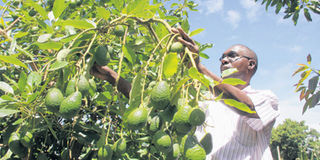Brighter prospects for avocado farmers

Maina Karuiru tends to his avocado trees at Kiarithaini villlage in Mathira. FILE / NATION
What you need to know:
- It is also very nutritious, he says. “It has at least 13 minerals. The fruit has 32 per cent oil content as compared to the local ones that have between two and eight per cent.”
- “I asked myself what these powerful people get from farming. It was only later that I learnt that horticultural crops had money. So I fully ventured into the trade.”
Wilson Ombongi looks at his lush green farm located on a hill at Riomoro in Kisii County with pride.
The one-and-a-half acre is flourishing with beans and potatoes. This is not what is putting a smile on his face, though. He has at least 200 avocado trees, which he is expecting to harvest the fruits in a few months’ time.
As he takes Seeds of Gold round his farm, clad in a red hat and a bluish overcoat and black trousers, he is optimistic that he made the right decision to plant the fruit.
His optimism stems from the fact that the Kisii County government is in the process of setting up an avocado processing factory, which will require farmers like Ombongi to supply it with the fruits.
The plan was revealed recently by Governor James Ongwae, who said a Turkish investor will put up a Sh300 million avocado processing factory in Kisii town.
Trial runs have been completed and full-scale processing is set to begin. “We have registered farmers to be contracted to deliver the produce. The venture will create more than 600 direct and indirect jobs for our people,” said Ongwae.
It is expected that the factory will process up to 80 tonnes of avocado daily. Presently, the area produces about 80 tonnes of avocado each day, which is sold to hawkers and middlemen who export them to markets in South Africa.
“The factory will save farmers’ from exploitation by middlemen who buy the commodity at a cheaper price. It will produce juice, cooking oil and syrup extracts,” Ongwae said.
Ombongi, who also keeps cattle on his farm, says he started planting avocado trees in 2010, following a visit by officials from Export Promotion Council, who convinced him and other farmers to try it out, promising good returns.
“At first it did not work for me. Some of the seedlings I planted dried but I did not give up. I am eagerly waiting for my first major harvest. I am yet to sell the avocados to a major buyer but I know for sure that the returns will be great.”
On his farm is a new variety known as the Golden Hass, which produces all-year round. Hass Avocados are oval shaped, with a small to medium sized seed. They have a creamy texture and great taste. They also have a distinctive skin that turns from green to purplish-black when ripe.
Cyrus Nyakundi, another farmer, equates planting this variety “to a life time investment”.
“One avocado tree, after three years, is capable of giving you Sh70,000 annually. If you plant at least 280 avocado trees on your one-acre farm, you can make a cool Sh19.6 million annually.”
AT LEAST 13 MINERALS
It is also very nutritious, he says. “It has at least 13 minerals. The fruit has 32 per cent oil content as compared to the local ones that have between two and eight per cent.”
Before venturing into the trade, Nyakundi used to work for a horticultural firm in Nairobi where they would deliver seedlings of various plants to prominent individuals.
“I asked myself what these powerful people get from farming. It was only later that I learnt that horticultural crops had money. So I fully ventured into the trade.”
He is now not only a proud owner of an avocado farm at Magena having 260 trees, but also has a nursery where seedlings are grown and distributed to farmers in parts of Nyanza, Rift Valley, Western as well as Central provinces. The nursery was set up with the help of USAid.
“Avocado seeds are first treated before they are planted. This is to ensure that they don’t get diseases like drips or scales. We also sterilise the soil in which we transplant the seedlings. Farmers can purchase them at a cost of Sh100 per seedling.”
“During weekdays, we have at least 20 people coming to our nursery to help us plant the seeds. We have given them a target of about 700 seedlings a day,” says the farmer, who has at least 270,000 seedlings through his firm Agro Plant Technology Nursery.




